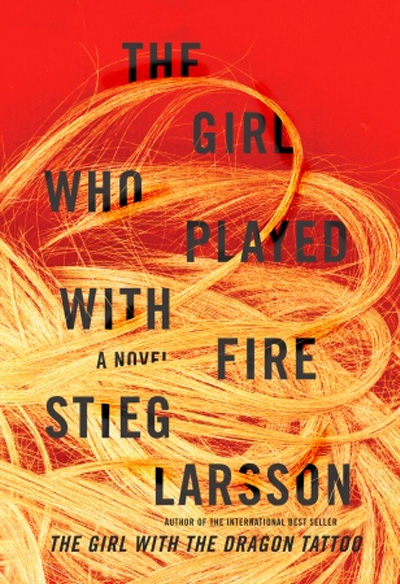 Firstly, I have to wonder at Acocella's approach. Props are given for Larsson's storytelling abilities, but not much more. Acocella is right to say that storytelling is not enough in carrying a book and making it "quality", but I wouldn't dismiss Larsson's writing so quickly. It's not splendidly beautiful, true, but the sometimes awkward bluntness has its charm, as though the grittiness is part of the story itself.
Firstly, I have to wonder at Acocella's approach. Props are given for Larsson's storytelling abilities, but not much more. Acocella is right to say that storytelling is not enough in carrying a book and making it "quality", but I wouldn't dismiss Larsson's writing so quickly. It's not splendidly beautiful, true, but the sometimes awkward bluntness has its charm, as though the grittiness is part of the story itself. Acocella should not dismiss storytelling quite so quickly, either. Larsson's books, whether because of marketing or actually because of superior talent, don't comfortably fit in the crime/thriller category. Perhaps I say this because these are genres I typically don't read, but the Millennium books do a good job of telling a story and not making the reader feel dumber for it. Part of it, as the Ape points out, is the setting. Distance a book from your own existence and that can make it seem all the more interesting.
Acocella should not dismiss storytelling quite so quickly, either. Larsson's books, whether because of marketing or actually because of superior talent, don't comfortably fit in the crime/thriller category. Perhaps I say this because these are genres I typically don't read, but the Millennium books do a good job of telling a story and not making the reader feel dumber for it. Part of it, as the Ape points out, is the setting. Distance a book from your own existence and that can make it seem all the more interesting. Then the most basic matter of all: the popularity issue. Acocella seems at times to dismiss the popularity because of a perceived sense of, for lack of a better term, crappiness. It's as though Acocella commits one of the greatest book-commenting crimes in existence: assuming something to be unequivocally bad just because you didn't like it. Therefore, the popularity is a mystery, when it's incredibly, incredibly obvious: people enjoy reading these books. I enjoy, on a very basic level, reading these books. Acocella seems so surprised that people like a book that fits into a popular genre, that's got a character most find to be pretty kick-[...] awesome, and that is definitely easy to read. "But it's a bad book!" Maybe, but other readers found it to be a lot of fun. And so: popular.
Then the most basic matter of all: the popularity issue. Acocella seems at times to dismiss the popularity because of a perceived sense of, for lack of a better term, crappiness. It's as though Acocella commits one of the greatest book-commenting crimes in existence: assuming something to be unequivocally bad just because you didn't like it. Therefore, the popularity is a mystery, when it's incredibly, incredibly obvious: people enjoy reading these books. I enjoy, on a very basic level, reading these books. Acocella seems so surprised that people like a book that fits into a popular genre, that's got a character most find to be pretty kick-[...] awesome, and that is definitely easy to read. "But it's a bad book!" Maybe, but other readers found it to be a lot of fun. And so: popular.The article has a lot more to it than these points that the Ape focuses on. Acocella writes a lot about Larsson himself, mostly raising strange conspiracy theories about whether or not he could have written the books and commenting rather casually on his personal and political lives (but in a very limited, carefully selected manner). It's an interesting article, but rather unsatisfying. Read the Ape's take on it instead.
* It should be noted that I have read only the first two books in the series, and neither was read in the English translation. In the interest of keeping this blog spoiler free, please refrain from mentioning anything from the second two books. Thank you.

Thanks for your comments on this article. I really enjoyed the Ape's rebuttal. This is an interesting topic...and what is wrong with liking a book that is "popular?" There seems to be this pervasive opinion in critical media that popularity=crappy writing...which cannot be the case all of the time.
ReplyDeleteWell, thanks for the mention and attention here. I like your point that these books don't really feel pulpy and dumb like your run-of-the mill thriller (though, like you, I don't have too many of these under my belt).
ReplyDeleteMaybe that's something to think about as well: these books scratch a particular itch we sometimes feel guilty about scratching. Here, though, sans guilt.
Can I also ask what language you read these in? This editing/translation palimpsest is the elephant in the room with these books, I think.
I agree: Ape's post is a fine one. K
ReplyDelete